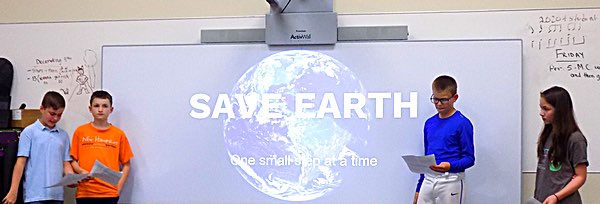- By Dan Veaner
- Around Town
 Print
Print 
Lansing Middle Schools's 6th Grade Green Team lobbied the Board Of Education Monday to reduce single-use plastic use in their cafeteria. 4 Rs Focus Group members Matthew and Valerie, and Science Club members Dean and Toby (with Mike manning the computer to change PowerPoint slides) told the board about how non-recyclable plastic cups and eating utensils are used in their school. The students offered over $1,000 they earned by recycling cans and bottles at the middle school to buy reusable bowls, and metal silverware with the money if the Board of Education would accept their proposal.
"We want to make Lansing more green by reducing the use of single-use plastic that our school produces," Matthew said. "We have been working all year to reduce the amount of single-use plastic that is used in the cafeteria. For example, we have accomplished the goal of eliminating the use of single-use straws."
The students said that items like plastic fruit cups are not accepted by the Tompkins County Department Of Recycling And Materials Management. The department can only accept plastics labeled 1, 2, and 5. Tompkins County was forced to claw back on many of the kinds of plastics they can accept because the simple truth is there is no place to send it.
18 months ago China banned almost all waste imports to prevent non-recyclable scrap smuggling. China accepted 6.4 million tons of plastic waste two years ago, more than half of all plastic waste in the world. Global plastic consumption has reached 400 million tons each year.
Since China instituted its ban, used plastics have been diverted to neighboring countries that have no way to recycle the materials, forcing its disposal in landfills. Trash from western countries was responsible for health and environmental problems, with a predictable outcome: Vietnam and Thailand have both announced they will block all imported plastics. Malaysian officials have been shutting down illegal waste importers, and is sending back tons of plastic waste back to the countries they received it from, including the United States and Canada, Australia, and Great Britain. Taiwan says that only single-type sorted plastics would be accepted there.Philippines officials are reportedly thinking about banning waste imports entirely.
 Only plastics labeled 1,2, and 5 are accepted by the Tompkins County Department Of Recycling And Materials Management"In the US only 9% of our recyclables are actually being recycled," Valerie said. "As of 2017 humans have created 8.3 billion tons of plastic. Only 30% is currently in use. This means 70% is in landfills or in the ocean. Recycling used plastic uses 88% less energy than making new plastic from raw materials. Enough plastic is thrown away each year to circle the Earth four times."
Only plastics labeled 1,2, and 5 are accepted by the Tompkins County Department Of Recycling And Materials Management"In the US only 9% of our recyclables are actually being recycled," Valerie said. "As of 2017 humans have created 8.3 billion tons of plastic. Only 30% is currently in use. This means 70% is in landfills or in the ocean. Recycling used plastic uses 88% less energy than making new plastic from raw materials. Enough plastic is thrown away each year to circle the Earth four times."Doing their part to make a dent in those statistics, the Green Team asked what the impact of eliminating 65 fruit cups per day (on bulk foods days at Lansing Middle School) would be if every school in the state also did it. They estimated 2015 fruit cups per month per school, and 9,714,315 fruit cups state-wide, assuming they were served every day. They estimated 58,285,890 fruit cups that end up in land-fills in New York State.
The students acknowledged that using reusable bowls and silverware may increase the workload for cafeteria staff, but offered creative ideas for collecting them after lunch, including one idea using magnetic strips to catch silverware that is inadvertently dumped in the trash and compost bins.
School Board members questioned the students on research they had done, testing their ideas, and interfacing with the cafeteria staff to make the changes a win for all stakeholders.
v15i23



